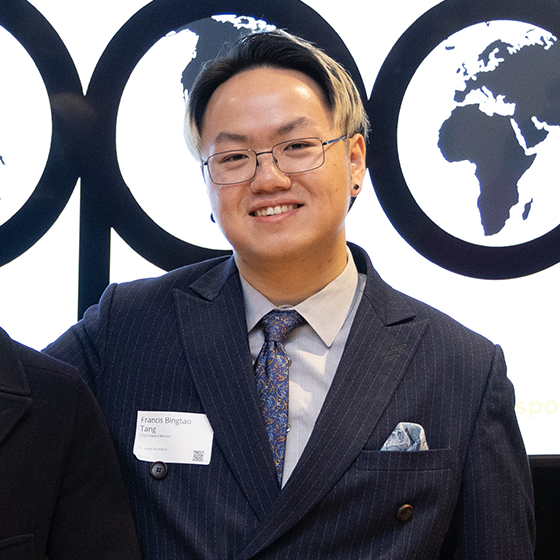Culture, Identities and Citizenship
Global Health and Environment
Human Rights
International Law and Organizations
International Political Economy
International Security and Diplomacy
Migration
Technology and Global Politics
Regional Studies focused on one of the following regions: Africa, Asia, Europe, Middle East and North Africa, or The Americas
Sample Coursework
Students choose from a rich array of social science courses that address some of today's most complex global issues. Here are sample courses that can apply to the various concentrations. Course offerings vary by semester. Visit our Answers page for current students for an updated schedule of course offerings.
Culture, Identities and Citizenship:
Islamism and Islamist Movements Today (PSC)
Study the historical, religious, social and political origins of Islamism and Islamist movements around the world today.
Gender in a Globalizing World (GEO)
Economic and cultural processes of globalization as they affect different groups of men, women and households; including gender and work, development and environmental change, and redefinitions of masculinity and femininity across the globe.
Modern South Asian Cultures (ANT)
Societies of India, Pakistan, Bangladesh and Sri Lanka. Social organization, economic and political structures, religions and world view, survey of languages, the arts. Transition and modernization, rural and urban problems.
Global Health and Environment:
Sustainability Science and Policy (PSC)
Environment and Development in the Global South (GEO)
Critical analyses of international development in theory and practice, especially as it relates to environmental change in complex ways in the Global South. Topics include modernization, participation, community, gender, sustainability, agriculture, trade, water and climate change.
Global Health (ANT)
Global health in anthropological perspective. Examines how culture affects people’s experience and response to morbidity and mortality. Considers topics like gender and health, reproductive health, infectious disease, health and inequality and health and war.
International Law and Organizations (ILO):
European Integration (GEO)
Explore the origins, nature and likely future course of the European Union. How will changing demographics, globalization, civic integration, power rivalry and sustainable development impact the future of the EU?
Global Governance (IRP)
Examine the theory and practice of global governance and international diplomacy through an in-depth study of the United Nations system.
Comparative Law and Courts (PSC)
Learn about different legal systems including common law, civil law, Islamic law and African and Asian legal traditions.
Human Rights:
Genocide, Atrocity, and Political Violence in the Modern World (HST)
Course examines: definitions and interpretations of genocide; case studies of mass killing and atrocity in multiple global contexts during the twentieth century (Armenia, Cambodia, Holocaust, Rwanda, Soviet Union and others).
Women, War and Peace (ANT)
Water: Environment, Society and Politics (GEO)
International Political Economy (IPE):
Economics of Globalization (ECN)
Learn about the history of globalization, trends and issues related to global trade, including its impact on labor, poverty, environment, etc.
International Political Economy of the Third World (PSC)
Learn about the making of the international system, the “third world,” globalization, trade, debt, multinational corporations and lending agencies (IMF, World Bank).
China's Economy and Financial System (IRP)
International Security and Diplomacy (ISD):
The Global Cold War (HST)
Examines the Cold War rivalry between the United States and the Soviet Union from a global perspective.
Gender, Militarism and War (PSC)
Examine militarism and war and their relationship to gender and power. Particular attention is given to how war impacts people differently across axes of race, class, ethnicity, sexuality and other forms of identity.
Ethnic Conflict (PSC)
Migration:
Refugees of International Politics (PSC)
Surveys global politics of refugees and those displaced by persecution, conflict, disasters or development. Topics include historical trends, legal regimes and ethical concerns. Explores causes and consequences of forced displacement, and responses by state and non-state actors.
Geographies of Migration and Mobility (GEO)
This course examines human migration and its sociocultural and political impacts on sending and receiving communities. Focused on the mobility of people, ideas and commodities, it investigates migration’s role in producing and transforming human geographies.
The Caribbean: Sex Workers, Transnational Capital and Tourism (SOC)
A political economy approach to educating students about the human and capital costs of tourism to the Caribbean. The integral relationship between sex work and Caribbean tourism exposes the region’s development that has resulted in its current configuration.
Regional Studies:
Africa
- South Africa (GEO)
- Africa and Global Affairs 1870 - Present (HST)
- African International Relations (PSC)
Asia
- Modern South Asian Cultures (ANT)
- Modern China (HST)
- Politics of East Asia (PSC)
Europe
- Transformation of Eastern Europe (ANT)
- Russia in the Twentieth Century (HST)
- Politics of Europe (PSC)
Middle East and North Africa
- Middle East in Anthropological Perspective (ANT)
- Politics of the Middle East (PSC)
- Politics of Iran (PSC)
The Americas
- Peoples and Cultures of North America (ANT)
- Latin American Development: Spatial Aspects (GEO)
- Modern Latin America (HST)
Looking for a more complete list of course offerings in international relations?

Maxwell Senior Honored by Overseas Press Club Foundation
My dream is to bring meaningful news to readers across the world, and to shed light on global events that could resonate with readers anywhere,” says Francis Tang, who is grateful for the education he received from Maxwell, which he says helped him better understand what he reported on as a student journalist.
Francis Tang
Overseas Press Club David R. Schweisberg Scholarship Recipient